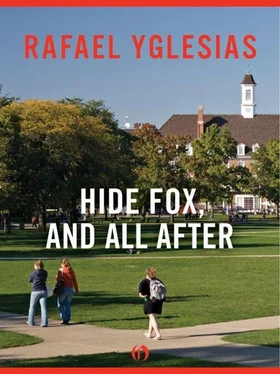But Raul was silent on the subject. He loved watching the enthusiasm the students had for Henderson. He observed with reverence the power of an image. And though he knew all the students were in for either a disappointment or a shock, he said nothing, for there were enough cynics about.
Today as he walked in the gray light of Porshe Hall, his usual emotions of respect and contempt were mingled with fear. Under past administrations, his first cutting spree would have been greeted with suspension or expulsion, and this one, the second, definitely by the latter. His fear was amplified by the fact that he had not yet spoken personally to Henderson. Behind closed doors, the man might be a lot less liberal than he was in the auditorium.
As for Henderson, he had no idea what to think. Two weeks of cutting! Without even an attempt at covering up. The opposite, in fact. Every day, promptly at two-thirty, Raul showed up for rehearsals. The boy was either emotionally disturbed or he was protesting something. Or — it was not unusual — his parents were insisting that he go to Cabot and he was trying to get thrown out. His parents had, after all, when called after a week’s absence, lied, saying he was home ill. They confessed to that when called a second time. Considering everything — the number of recommendations from Raul’s teachers (the most glowing from Mr. Miller, who had said that Raul was the best actor he had worked with in thirty-five years), the suicidal manner in which the boy cut — this seemed the most plausible idea and the most distasteful. Distasteful, since a power struggle had developed because of him. Two joint faculty- administration meetings had been held over the issue, a dubious honor no other student had yet received. If Raul, as Mr. Bowden, Raul’s English teacher, and Mr. Miller both suggested, was protesting the lack of time he had for his own work, then Henderson’s position was clear. It was symbolic of what he was calling for — meeting individual needs. The rest of the faculty and the administration had been vehemently against this. He cut — he should be thrown out. He had already been given one warning.
If it all boiled down to the boy wanting to leave, Henderson’s passionate and uninformed defense of him would seem foolish. He was as anxious to see what Raul would say as Raul was about him.
On hearing from his secretary that Mr. Miller had made an appointment for Raul, Henderson left immediately for the faculty lounge. He had told his secretary to show Raul into his office, and, finding the lounge empty, rather than remove his pipe, the form in which he told everyone that his old smoking habit had returned, he took out a cigarette. The excitement with which he smoked reminded him of the feelings he had when, as an adolescent, he began.
Raul surrounded himself in an aura of melancholy. This will be a great turning point of your life, he told himself. Or perhaps an anticlimax. It is a test, certainly. Tell him the truth — I will, I’ll see if he can bear it.
He thought, or rather felt, the enormity that the loss of Cabot’s theater would be. Knowing it would leave him weak, he suppressed the thought. But the tremors of its wake could be felt throughout his body. His heart was so contracted with nervousness, he could barely breathe, tears of sweat glistened on his hands.
He opened the doors into the small wooden shed erected each winter to protect the entrance from draft, opened the two glass doors into Porshe Hall, went up a short flight of stairs, opened the doors leading to the main floor, and was greeted there by Mrs. Beruth, the nurse. In her small compartment, the infirmary, she faced those two doors and with a habitual disinterest gave at most a sour smile to any student. Raul, though he had lately been in close contact with her, had never yet received a hello, but did this time, out of sympathy. He nodded nervously and went down the hall a few steps, entering the large room that served as the office for the secretaries of the head of the Upper School, the assistant headmaster, and the headmaster himself.
He told Henderson’s secretary that he had an appointment with the headmaster. “Oh yes,” she said, smiling pleasantly, “you’re Raul, aren’t you?”
Raul, huskily, said yes.
“Well, Mr. Henderson will be along in just a moment. Go right ahead into his office.” She pointed to a short passageway on the right leading to a large office. Raul went down this and into the office, seating himself in a corner of the room on a large leather couch.
The room was sumptuous, with none of the metallic atmosphere of school offices. Along the wall behind Mr. Henderson’s desk were mahogany bookcases filled with beautifully bound editions; a massive oak desk dug permanently into the rich carpet; three floor-to-ceiling windows filled the room with gray light, and two leather couches, in the other corner of the room, looked down upon a glass- covered coffee table. Mr. Henderson’s high-backed leather swivel chair seemed poised, as if its occupant had hurried out, and his desk was impressively littered with papers.
Raul calmed considerably on entering the room. The gray light justified the solemnity he felt, and the dignity of the surroundings dispelled his fears of meeting a school bureaucrat.
Mr. Henderson was also calmed by remembering that Raul had been going to rehearsals every day. He’s been cutting classes while going to the theater — he wants to do his own work. He crossed the hall with the brisk step that was so much a part of his image, nodded when his secretary pointed toward his office to indicate that Raul was there, and his hand, even before he crossed the threshold, extended itself involuntarily.
Raul’s latent nervousness leapt into his chest and throat. Unconsciously mimicking Henderson’s enterprising handshake, he stood up and shook hands with him, his nervousness subsiding as quickly as it had come. He reseated himself awkwardly. Mr. Henderson, his momentum unbroken, took Raul’s folder off his desk and pulled a chair over to face Raul on the couch.
He sat down, opened the folder, and began glancing through it, from time to time brushing invisible lint off his gray Brooks Brothers suit.
Raul relaxed. He felt very comfortable on the couch, abstracted from the scene by the continuing folds of gray light playing about the room.
“Well,” Mr. Henderson said, placing the folder on the coffee table.
Raul looked up.
“Why have you been doing this?” he said, studying Raul’s face. “I don’t know. I certainly don’t know why you’re doing this.” He sighed. “There are members of the faculty who say I should…who say I shouldn’t care, that I should just throw you out. That doesn’t sound very reasonable to you, does it?”
Raul quietly said no.
“I didn’t think so.” He paused. “It doesn’t seem very reasonable to me either. I don’t know if it’s that you don’t like Cabot or that, uh, well,” he said hurriedly, “is it your parents who are insisting you go here?”
Raul looked, and was, surprised. “No. No, not at all.”
Mr. Henderson looked down, intently studying his trouser legs. He brushed them casually with his right hand. “It could be,” he said, “it could be that you’re trying to get away from something, that you’re doing this unconsciously…” He looked at Raul and paused.
Raul smiled. “It’s quite conscious.”
“It is,” he said, laughing. “All right then, let’s find out. Why have you been cutting?”
Raul looked down, thinking of how he could phrase his reasoning politely. Mr. Henderson waited respectfully.
“I have,” Raul began, his voice tremulous, “I have, though I’m perhaps too young for it to be taken seriously, very specific goals.”
Читать дальше











